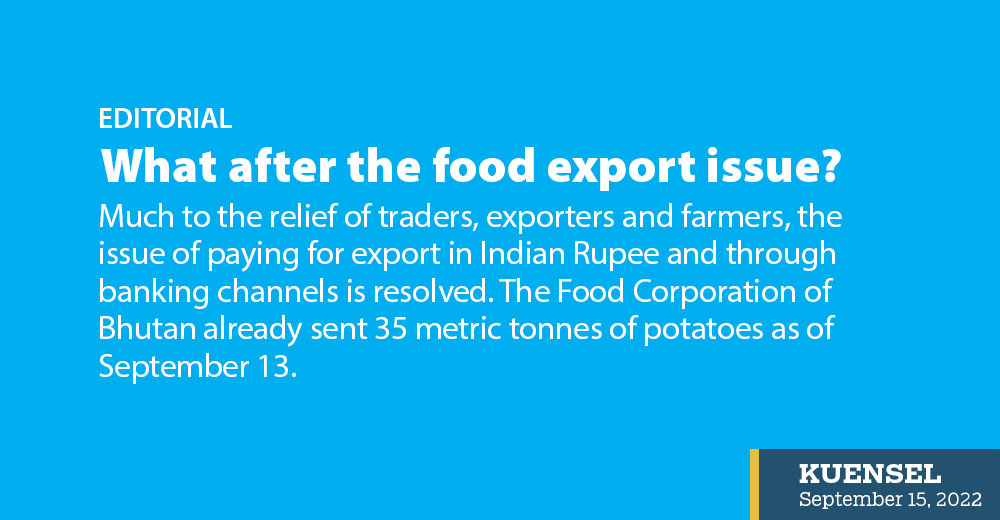Much to the relief of traders, exporters and farmers, the issue of paying for export in Indian Rupee and through banking channels is resolved. The Food Corporation of Bhutan already sent 35 metric tonnes of potatoes as of September 13.
But for a few unhappy locals in Jaigaon, big traders and importers didn’t find the central bank’s intervention – channelising payment through banks – an issue. Bhutanese food crops are sold beyond Jaigaon. Traders beyond Jaigaon have been paying those in the small town in Rupees. They need goods to fill the shortage in the local Indian market. Simply put, it is business.
What Bhutanese exports to India is a drop in the ocean. The summer vegetables, especially potatoes, find a good market in the neighbouring Indian districts. It actually fills the shortage when the vast plains in Assam and Bengal are flooded, damaging crops entire. For the rest of the year, Bhutanese import thousands of tonnes of vegetables from India.
People on both sides of the gate know the bigger picture. They are aware that while trading minor hurdles would arise and that some petty groups trying to jeopardise trade and business are not in the interest of all.
What we should be concerned about, however, is whether we will have excess for export. The greater risk would come from climate change. The images of inundated fields in neighbouring Assam that wiped out hundreds of thousands of hectares of crop are fresh in our minds. Climate experts warn about severe weather conditions with increased frequency all over the world. They say the Himalayan region is one of the most vulnerable to impacts of climate change. Storms, droughts, floods and excessive heat directly impact food supply.
For us, there is also the risk of dependency. We have seen in the recent past how countries curtail export of food or increase price when there is a shortage. The government of India did the same with wheat, sugar and rice. Fortunately, some of the restrictions did not apply to Bhutan. But a severe food shortage in India would have a direct impact on us.
There are food crops that we cannot grow because of our terrain or climatic conditions. There are some that grow in abundance, like potatoes. With the right intervention or policies, we should be able to reduce the burden from export and import uncertainties.
We are more than vegetable self-sufficient in summer. There is a shortage in winter, but if we want, we can grow enough to see through the colder months. Warmer places in the interior and the southern plains can grow winter vegetables. We depend on import largely because it is cheaper.
If we can store our excess potatoes, cabbages, cauliflower for winter, we need not import. It is said that traders in Falakata, West Bengal, with cold storage facilities store what they import in summer and then sell it back to Bhutan in winter at a higher price. The agriculture ministry has called on private partners to establish cold storage in the country. This is a business opportunity and a solution to farmers, traders and consumers.
Who knows how to grow food will never go hungry.


